人教版(2019)必修第一册 unit 5 Languages around the world grammar(共32页PPT)
文档属性
| 名称 | 人教版(2019)必修第一册 unit 5 Languages around the world grammar(共32页PPT) |  | |
| 格式 | pptx | ||
| 文件大小 | 5.3MB | ||
| 资源类型 | 教案 | ||
| 版本资源 | 人教版(2019) | ||
| 科目 | 英语 | ||
| 更新时间 | 2023-01-14 11:43:31 | ||
图片预览

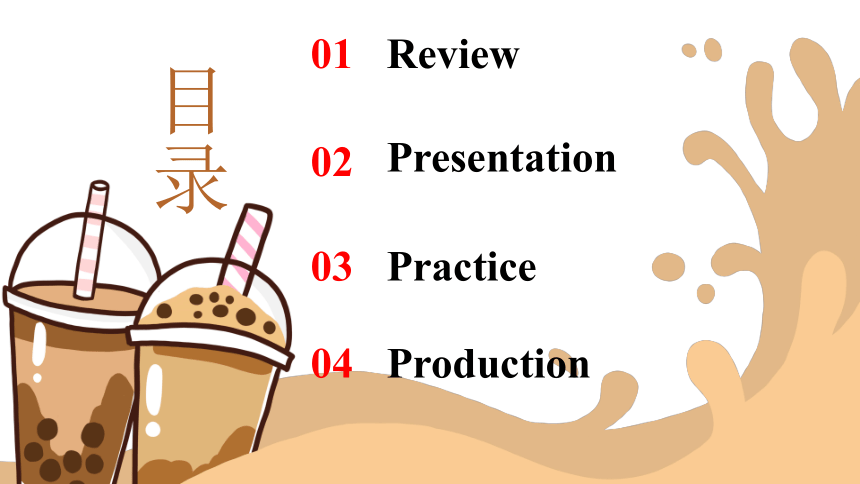

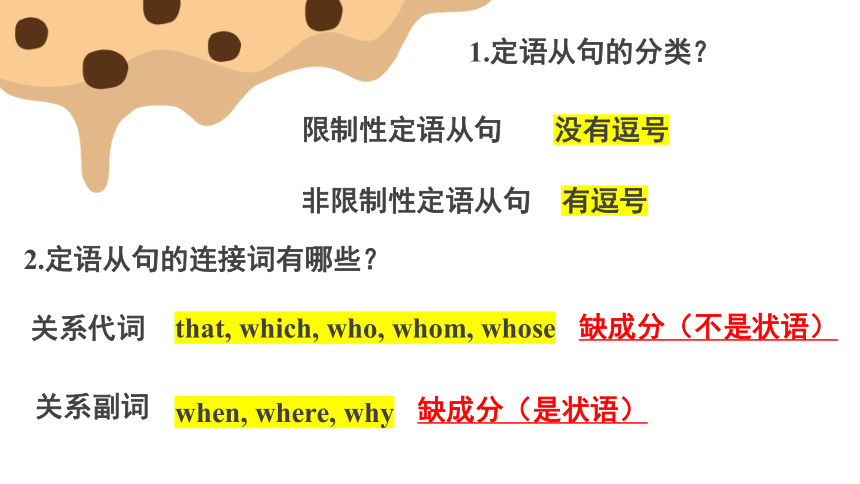

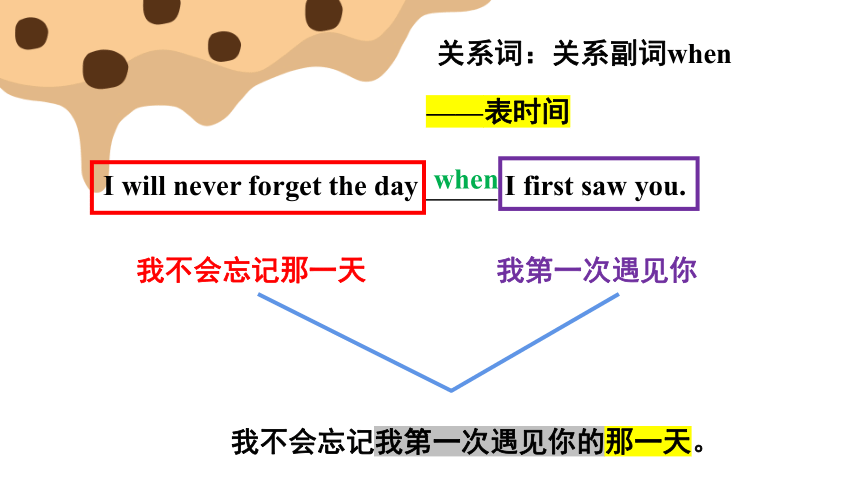
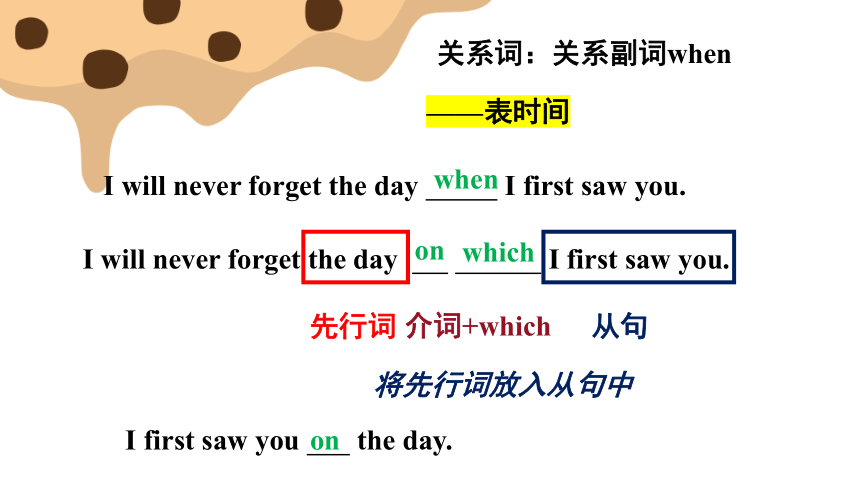
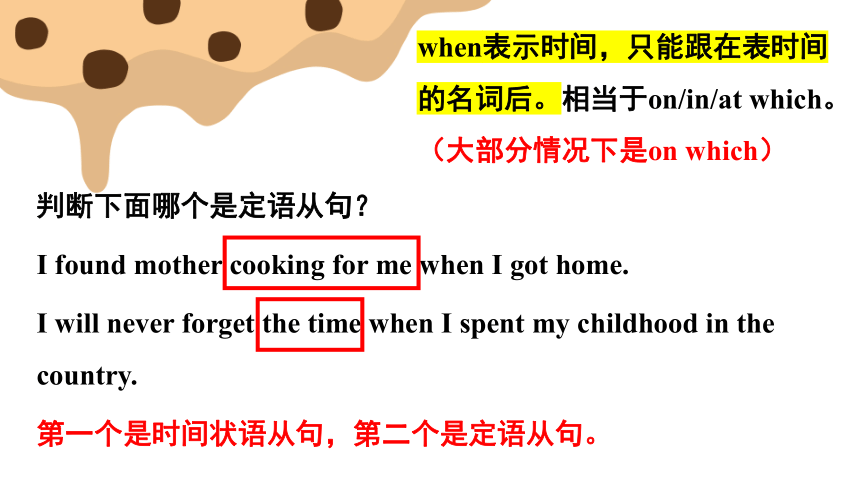
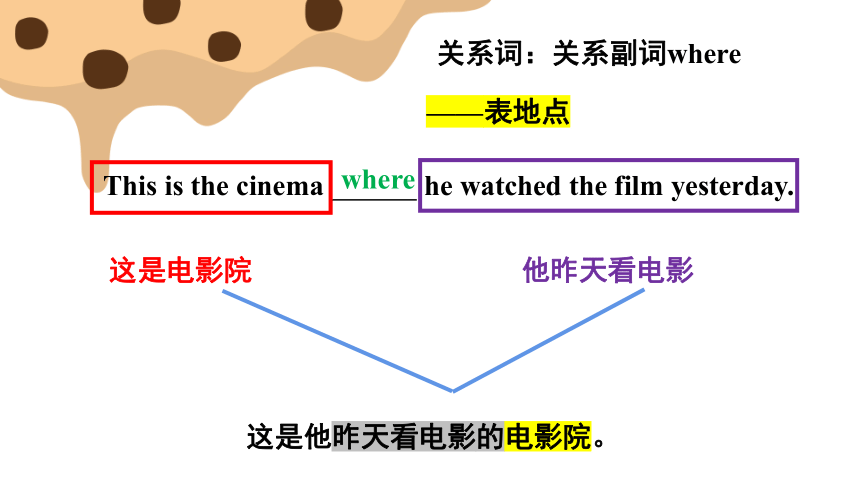
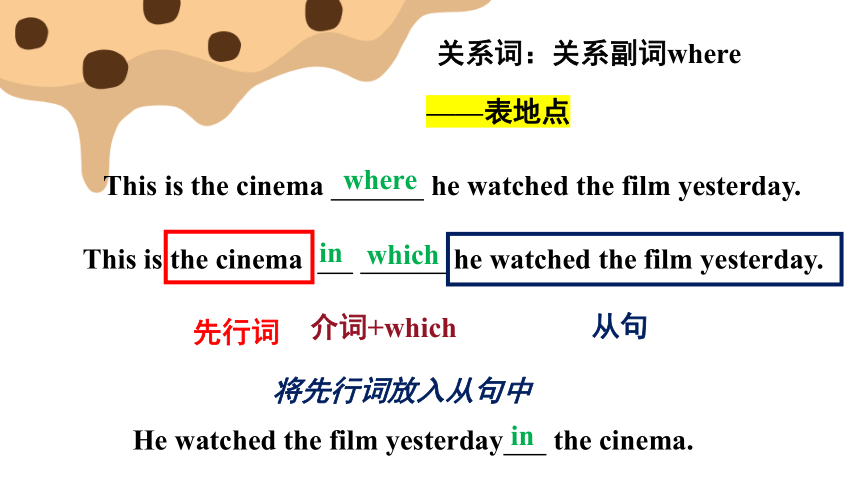
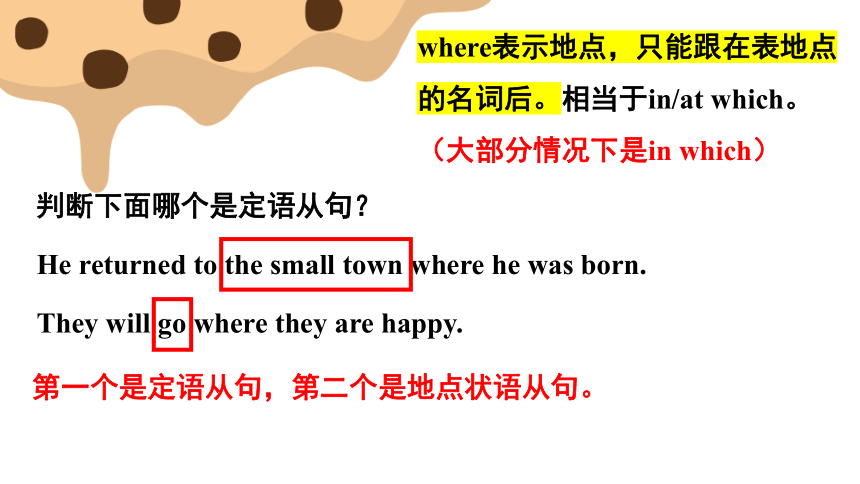
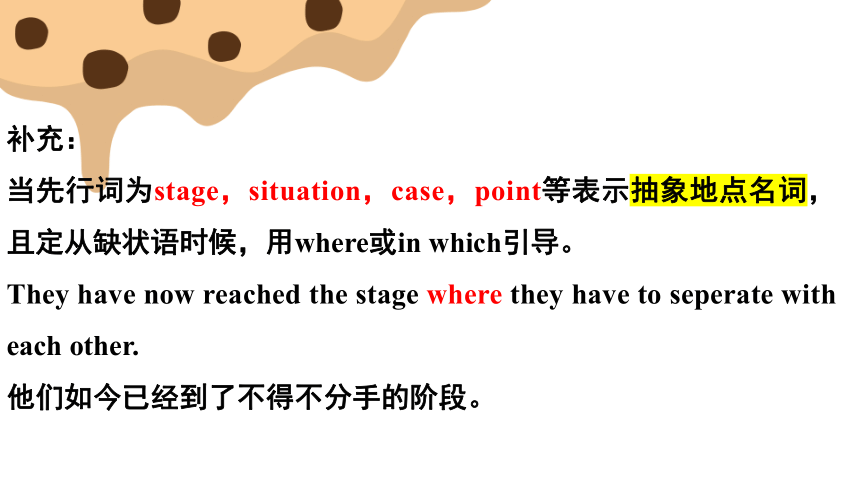
文档简介
(共32张PPT)
新人教版(2019) 必修第一册
Unit 5 Language Around the World
Discover Useful Structures
目录
Review
Presentation
Practice
01
02
03
Production
04
Review
01
1.定语从句的分类?
2.定语从句的连接词有哪些?
限制性定语从句
非限制性定语从句
没有逗号
关系代词
关系副词
that, which, who, whom, whose
when, where, why
缺成分(不是状语)
缺成分(是状语)
有逗号
Presentation
02
关系词:关系副词when
——表时间
I will never forget the day I first saw you.
我不会忘记那一天
我第一次遇见你
我不会忘记我第一次遇见你的那一天。
when
关系词:关系副词when
——表时间
I will never forget the day I first saw you.
when
I will never forget the day I first saw you.
介词+which
先行词
从句
将先行词放入从句中
I first saw you the day.
on
on
which
when表示时间,只能跟在表时间的名词后。相当于on/in/at which。(大部分情况下是on which)
I found mother cooking for me when I got home.
I will never forget the time when I spent my childhood in the country.
判断下面哪个是定语从句?
第一个是时间状语从句,第二个是定语从句。
关系词:关系副词where
——表地点
This is the cinema he watched the film yesterday.
这是电影院
他昨天看电影
这是他昨天看电影的电影院。
where
关系词:关系副词where
——表地点
This is the cinema he watched the film yesterday.
where
This is the cinema he watched the film yesterday.
介词+which
先行词
从句
将先行词放入从句中
He watched the film yesterday the cinema.
in
in
which
where表示地点,只能跟在表地点的名词后。相当于in/at which。 (大部分情况下是in which)
He returned to the small town where he was born.
They will go where they are happy.
判断下面哪个是定语从句?
第一个是定语从句,第二个是地点状语从句。
补充:
当先行词为stage,situation,case,point等表示抽象地点名词,且定从缺状语时候,用where或in which引导。
They have now reached the stage where they have to seperate with each other.
他们如今已经到了不得不分手的阶段。
关系词:关系副词why
——表原因
This is the reason he was late yesterday.
这是原因
他昨天迟到
这是他昨天迟到的原因。
why
关系词:关系副词why
——表原因
This is the reason he was late yesterday.
介词+which
先行词
从句
将先行词放入从句中
He was late yesterday the reason.
for
for
which
This is the reason he was late yesterday.
why
why表示原因,只能跟在表原因的名词后,通常是reason一个词。相当于for which。
I don’t know the reason for which he said these words.
We stayed at home for it was raining outside just now.
判断下面哪个是定语从句?
第一个是定语从句,第二个是原因状语从句。
当从句完整时候,考虑关系副词(在从句中做状语)
This is the place he works.
This is the place we visited last year.
That was the time he arrived.
Do you still remember the time we spent together
This is the reason he went.
The reason he gave us was quite reasonable.
易混点:
什么时候用关系代词,什么时候用关系副词?
where
when
why
that/which
that/which
that/which
二、“介词 + 关系代词”引导的定语从句
1.关系代词的确定
当先行词是人时,用介词 + whom 引导定语从句:
Do you know the girl with ________ our teacher is talking
当先行词是物时,用介词 + which引导定语从句:
This is the room in ___________ my grandmother used to live.
whom
which
二、“介词 + 关系代词”引导的定语从句
2. 介词的确定
根据先行词的搭配关系:
(1) I still remember the day _______ _______ I met TFboys.
(2) I will never forget the farm _______ ______ I worked with you.
(3) The money _______ _______ you were to buy food is gone.
on which
on which
with which
(on the day 在那天)
(on the farm 在农场)
(with the money 用钱)
二、“介词 + 关系代词”引导的定语从句
2. 介词的确定
根据谓语动词或形容词的搭配习惯
(1)Do you like the book _______ _______ she spent $10
(2) Do you like the book _______ _______ she paid $10
(3) The West Lake, _______ _______ Hangzhou is famous, is a beautiful place.
on which
for which
for which
二、“介词 + 关系代词”引导的定语从句
2. 介词的确定
根据句子的意思来确定
(1)Air, _________ which man can’t live, is really important.
空气非常重要,没有了它人类便不能生存。
(2) This is the man _______ whom my brother has worked for ten
years.
这就是和我弟弟一起工作了十年的那个人。
without
with
二、“介词 + 关系代词”引导的定语从句
2. 介词的确定
表示“所有”或“整体的一部分”时通常用介词 “of”
(1)He has two sons, _____________ graduated from Peking University.
他有两个儿子,他们都毕业于北京大学。
(2)Tom wrote many children’s books, nearly half __________ were
about campus culture.
汤姆写了很多儿童书籍,其中将近一半是关于校园文化的。
both of whom
of which
Practice
03
用关系副词填空。
1. Their child is at the stage ________ she can say individual words
but not full sentences.
2. We will put off the picnic in the park until next week, ________
the weather may be better.
3. As the smallest child of his family, Alex is always longing for the
time ________ he should be able to be independent.
where
when
when
用关系副词填空。
4. Students should involve themselves in community activities
________ they can gain experience for growth.
5. The village ________ I was born has become into a town.
6. The reason ________ he resigned is known to us.
where
where
why
用介词 + 关系代词填空。
1. Who is the person _______ _______ you just shook hands
2. China is a powerful country, _______ _______ we are proud.
3. This is the tree _______ _______ we used to play games.
4. This is my glasses, _______ _______ I can’t see clearly.
5. Do you remember the day _______ _______ you joined our club
with whom
without which
under which
of which
on which
Production
04
课本P97第三题
The United Nations (UN) is an organization aims to promote international cooperation. It was founded in 1945 and has about 190 member states. This is the reason the UN has a number of translators and interpreters, since international meetings in the UN are attended by people speak so many different languages.
that which where (in) which who why
that/which
why
who
课本P97第三题
Translators are people usually work with written language, while interpreters work with spoken language. Meetings
only two languages are used may need only one interpreter, while larger events leaders from many countries gather may need over 70 interpreters.
that which where (in) which who why
who
where/in which
where/in which
课本P97第三题
There are two main ways that an interpreters can provide spoken translation. First is the method requires the speaker to stop every few sentences, so the interpreter can translate those sentences for the audience. The second method is the one
the interpreter listens and translates at the same time.
that which where (in) which who why
which/that
where/in which
课本P97第三题
This second method is more difficult, but the place
the interpreter is located is not so important. The interpreter can be in a completely different location from the speaker, listen through headphones, and translate for an audience sitting in another location!
that which where (in) which who why
where/in which
指原因
关系代词
指代事物
指时间
指地点
所属关系
指代人
关系副词
who, whom, that
which, that
whose, of which
where
when
why
Thanks for your listening!
新人教版(2019) 必修第一册
Unit 5 Language Around the World
Discover Useful Structures
目录
Review
Presentation
Practice
01
02
03
Production
04
Review
01
1.定语从句的分类?
2.定语从句的连接词有哪些?
限制性定语从句
非限制性定语从句
没有逗号
关系代词
关系副词
that, which, who, whom, whose
when, where, why
缺成分(不是状语)
缺成分(是状语)
有逗号
Presentation
02
关系词:关系副词when
——表时间
I will never forget the day I first saw you.
我不会忘记那一天
我第一次遇见你
我不会忘记我第一次遇见你的那一天。
when
关系词:关系副词when
——表时间
I will never forget the day I first saw you.
when
I will never forget the day I first saw you.
介词+which
先行词
从句
将先行词放入从句中
I first saw you the day.
on
on
which
when表示时间,只能跟在表时间的名词后。相当于on/in/at which。(大部分情况下是on which)
I found mother cooking for me when I got home.
I will never forget the time when I spent my childhood in the country.
判断下面哪个是定语从句?
第一个是时间状语从句,第二个是定语从句。
关系词:关系副词where
——表地点
This is the cinema he watched the film yesterday.
这是电影院
他昨天看电影
这是他昨天看电影的电影院。
where
关系词:关系副词where
——表地点
This is the cinema he watched the film yesterday.
where
This is the cinema he watched the film yesterday.
介词+which
先行词
从句
将先行词放入从句中
He watched the film yesterday the cinema.
in
in
which
where表示地点,只能跟在表地点的名词后。相当于in/at which。 (大部分情况下是in which)
He returned to the small town where he was born.
They will go where they are happy.
判断下面哪个是定语从句?
第一个是定语从句,第二个是地点状语从句。
补充:
当先行词为stage,situation,case,point等表示抽象地点名词,且定从缺状语时候,用where或in which引导。
They have now reached the stage where they have to seperate with each other.
他们如今已经到了不得不分手的阶段。
关系词:关系副词why
——表原因
This is the reason he was late yesterday.
这是原因
他昨天迟到
这是他昨天迟到的原因。
why
关系词:关系副词why
——表原因
This is the reason he was late yesterday.
介词+which
先行词
从句
将先行词放入从句中
He was late yesterday the reason.
for
for
which
This is the reason he was late yesterday.
why
why表示原因,只能跟在表原因的名词后,通常是reason一个词。相当于for which。
I don’t know the reason for which he said these words.
We stayed at home for it was raining outside just now.
判断下面哪个是定语从句?
第一个是定语从句,第二个是原因状语从句。
当从句完整时候,考虑关系副词(在从句中做状语)
This is the place he works.
This is the place we visited last year.
That was the time he arrived.
Do you still remember the time we spent together
This is the reason he went.
The reason he gave us was quite reasonable.
易混点:
什么时候用关系代词,什么时候用关系副词?
where
when
why
that/which
that/which
that/which
二、“介词 + 关系代词”引导的定语从句
1.关系代词的确定
当先行词是人时,用介词 + whom 引导定语从句:
Do you know the girl with ________ our teacher is talking
当先行词是物时,用介词 + which引导定语从句:
This is the room in ___________ my grandmother used to live.
whom
which
二、“介词 + 关系代词”引导的定语从句
2. 介词的确定
根据先行词的搭配关系:
(1) I still remember the day _______ _______ I met TFboys.
(2) I will never forget the farm _______ ______ I worked with you.
(3) The money _______ _______ you were to buy food is gone.
on which
on which
with which
(on the day 在那天)
(on the farm 在农场)
(with the money 用钱)
二、“介词 + 关系代词”引导的定语从句
2. 介词的确定
根据谓语动词或形容词的搭配习惯
(1)Do you like the book _______ _______ she spent $10
(2) Do you like the book _______ _______ she paid $10
(3) The West Lake, _______ _______ Hangzhou is famous, is a beautiful place.
on which
for which
for which
二、“介词 + 关系代词”引导的定语从句
2. 介词的确定
根据句子的意思来确定
(1)Air, _________ which man can’t live, is really important.
空气非常重要,没有了它人类便不能生存。
(2) This is the man _______ whom my brother has worked for ten
years.
这就是和我弟弟一起工作了十年的那个人。
without
with
二、“介词 + 关系代词”引导的定语从句
2. 介词的确定
表示“所有”或“整体的一部分”时通常用介词 “of”
(1)He has two sons, _____________ graduated from Peking University.
他有两个儿子,他们都毕业于北京大学。
(2)Tom wrote many children’s books, nearly half __________ were
about campus culture.
汤姆写了很多儿童书籍,其中将近一半是关于校园文化的。
both of whom
of which
Practice
03
用关系副词填空。
1. Their child is at the stage ________ she can say individual words
but not full sentences.
2. We will put off the picnic in the park until next week, ________
the weather may be better.
3. As the smallest child of his family, Alex is always longing for the
time ________ he should be able to be independent.
where
when
when
用关系副词填空。
4. Students should involve themselves in community activities
________ they can gain experience for growth.
5. The village ________ I was born has become into a town.
6. The reason ________ he resigned is known to us.
where
where
why
用介词 + 关系代词填空。
1. Who is the person _______ _______ you just shook hands
2. China is a powerful country, _______ _______ we are proud.
3. This is the tree _______ _______ we used to play games.
4. This is my glasses, _______ _______ I can’t see clearly.
5. Do you remember the day _______ _______ you joined our club
with whom
without which
under which
of which
on which
Production
04
课本P97第三题
The United Nations (UN) is an organization aims to promote international cooperation. It was founded in 1945 and has about 190 member states. This is the reason the UN has a number of translators and interpreters, since international meetings in the UN are attended by people speak so many different languages.
that which where (in) which who why
that/which
why
who
课本P97第三题
Translators are people usually work with written language, while interpreters work with spoken language. Meetings
only two languages are used may need only one interpreter, while larger events leaders from many countries gather may need over 70 interpreters.
that which where (in) which who why
who
where/in which
where/in which
课本P97第三题
There are two main ways that an interpreters can provide spoken translation. First is the method requires the speaker to stop every few sentences, so the interpreter can translate those sentences for the audience. The second method is the one
the interpreter listens and translates at the same time.
that which where (in) which who why
which/that
where/in which
课本P97第三题
This second method is more difficult, but the place
the interpreter is located is not so important. The interpreter can be in a completely different location from the speaker, listen through headphones, and translate for an audience sitting in another location!
that which where (in) which who why
where/in which
指原因
关系代词
指代事物
指时间
指地点
所属关系
指代人
关系副词
who, whom, that
which, that
whose, of which
where
when
why
Thanks for your listening!
